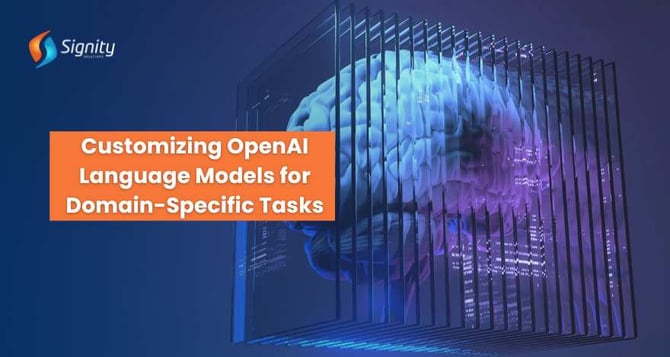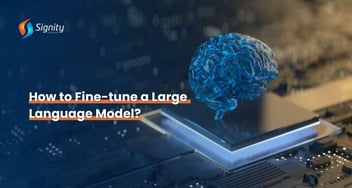Customizing OpenAI Language Models for Domain-Specific Tasks
Explore the role of AI-generated data reports in enhancing decision-making efficiency. It delves into the process of customizing language models like GPT-3 for domain-specific tasks, providing insights into data collection, preprocessing, fine-tuning, and usage.

Introduction
Language models like OpenAI's GPT-3 can generate human-like text across a wide range of topics. However, they are not always perfectly suited for domain-specific tasks. Customizing these models can significantly enhance their performance in specialized areas. In this article, we'll explore how to fine-tune and use OpenAI language models for domain-specific tasks, along with code snippets to guide you through the process.
Prerequisites
Before we dive into the customization process, you should have the following prerequisites in place:
- Access to OpenAI GPT-3: You should have access to OpenAI's GPT-3 API. If you haven't already, you can request access from OpenAI.
- Python Environment: Ensure you have a Python environment set up. We'll be using Python for the code examples.
- API Key: Obtain your API key from OpenAI and keep it handy for authentication.
| Join industry leaders in leveraging AI-generated data reports. Partner with Our Company for innovative solutions that drive success. |
Fine-Tuning Overview
Fine-tuning is the process of training a pre-existing language model on a domain-specific dataset. OpenAI currently only supports fine-tuning of their base models, so you won't be able to fine-tune the largest models like `gpt-3.5-turbo`. Here are the steps to fine-tune a model:
- Data Collection: Collect a dataset that is specific to your domain or task. Ensure that the data is labeled or structured appropriately.
- Data Preprocessing: Clean and preprocess your data. Tokenize it into suitable input-output pairs for training.
- Fine-Tuning: Fine-tune the base model using your custom dataset. OpenAI provides guidelines and instructions for this process.
- Testing and Validation: Evaluate your fine-tuned model to ensure it performs well on your specific task.
- Inference: Use the fine-tuned model to perform tasks related to your domain.
Related Read: The Role of Transformers in Revolutionizing NLP
Code Snippets
Let's look at some code snippets to get you started with fine-tuning and using a custom model for domain-specific tasks.
Fine-Tuning with Hugging Face Transformers:
Hugging Face Transformers is a popular library for working with pre-trained language models, including GPT-3. Here's how you can fine-tune a base model:
|
|
2. Using Your Custom Model:
After fine-tuning, you can use your custom model for various domain-specific tasks:
|
|
Related Read: Top 15 Large Language Models in 2024
How Our Company Empowers AI-Generated Data Reports
We specialize in leveraging the power of generative AI technology to provide tailored solutions for data-driven decision-making. Here's how we facilitate the generation of AI-driven data reports:
-
Expertise in Generative AI Development: As a leading generative AI development company, we possess extensive experience fine-tuning language models like GPT-3 for domain-specific tasks. Our team of ChatGPT developers excels at customizing models to meet the unique requirements of various industries.
-
Customized Solutions: We work closely with clients to understand their specific needs and objectives, tailoring our approach to fine-tuning language models accordingly. Whether it's in healthcare, finance, marketing, or any other sector, our solutions are designed to optimize efficiency and accuracy in decision-making processes.
-
Seamless Integration: We offer seamless integration of AI-generated data reports into existing workflows and systems. Our solutions are designed to complement and enhance your current decision-making processes, providing actionable insights in a timely and efficient manner.
-
Continuous Support and Improvement: We provide ongoing support to ensure the continued success of AI-generated data reports within your organization. Our team remains dedicated to refining and improving models over time, keeping them aligned with evolving business needs and industry trends.
Unlock the Power of AI-generated Data Reports Tailored to Your Industry Needs
Discover how AI-generated data reports can enhance decision-making processes with Signity. Our solutions offer actionable insights tailored to your needs.
Conclusion
Customizing OpenAI language models for domain-specific tasks involve collecting, preprocessing, and fine-tuning on a custom dataset. Hugging Face Transformers provides a convenient framework for this process. By following these steps and using the provided code snippets, you can tailor GPT-3 to perform exceptionally well in your specific domain, opening up a wide range of possibilities for applications and automation.


%201-1.webp?width=148&height=74&name=our%20work%20(2)%201-1.webp)


.png?width=344&height=101&name=Mask%20group%20(5).png)
















